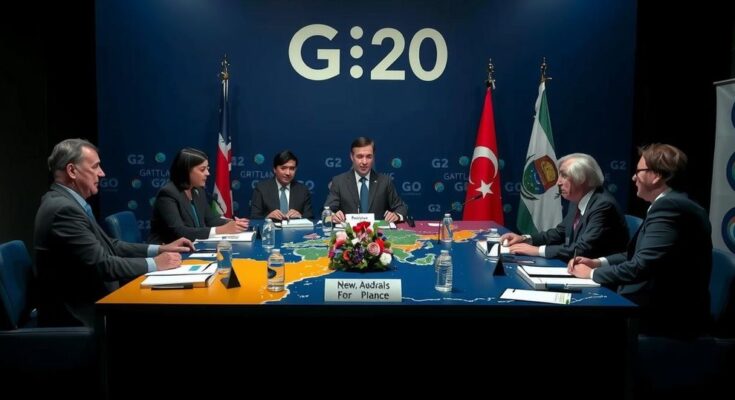The UN warned that G20 leaders must agree on climate finance for poor countries at their Rio summit or risk severe economic consequences. As discussions unfold, the urgency for financial aid to tackle climate change and debt relief for developing nations is critical, with targets set for reaching $1 trillion annually by 2030. The outcome of these talks will significantly impact global economies in light of ongoing climate challenges.
The United Nations has issued a stark warning regarding the upcoming G20 summit in Rio de Janeiro, emphasizing that failure to secure financial commitments for impoverished nations to combat climate change could lead to “economic carnage.” With discussions scheduled for this week, leaders from the world’s largest economies must come together to provide the necessary billions that experts have deemed essential for assisting poorer nations in mitigating greenhouse gas emissions and adapting to the effects of climate change. Simon Stiell, the UN’s climate chief, urged the G20 to prioritize climate action, highlighting that climate change impacts are already disrupting economies globally, affecting supply chains, food prices, and increasing inflation rates. He stated, “Without rapid cuts in emissions, no G20 economy will be spared from climate-driven economic carnage.” Stiell has also called for debt relief discussions, noting that many developing nations are unable to improve their climate resilience amid excessive debt burdens exacerbated by rising interest rates. As the G20 leaders convene, the urgency of this matter is amplified by the stalling discussions at the Cop29 summit, where many ministers from G20 countries have yet to formulate substantial financial proposals. Furthermore, developing countries are aiming for a global financial arrangement to reach $1 trillion in annual funding by 2030, drawn from a diverse pool including private investments, contributions from multilateral banks, and philanthropic donations. Criticism has also arisen about the venue for climate negotiations, particularly in Azerbaijan, where fossil fuels dominate the economy. Prominent climate advocates have called for future conferences to occur only in nations with strong commitments to climate action. As global leaders meet, expectations will remain high for actionable climate finance commitments and stringent emissions targets, with Brazil hosting next year’s Cop and likely pressing for accountability among G20 nations.
The United Nations’ recent warnings about the G20 summit underline the critical nature of climate finance for impoverished countries. Discussions involve significant financial strategies in combating climate change, particularly as developing nations face mounting difficulties due to climate impacts and debt crises. The economic interrelations of climate change and financial commitments necessitate urgent attention from global leaders, particularly those in wealthy nations, as they gather to deliberate their climate responsibilities. The outcome not only influences developing countries but also has resonating effects on the global economy, especially in light of rising inflation and supply chain disruptions.
In summary, the upcoming G20 summit in Rio de Janeiro serves as a critical juncture for global leaders to address the pressing need for climate finance to support vulnerable nations. The UN has underscored the potential economic ramifications of inaction, warning of the dire consequences of climate change impacts on all economies. The call for international cooperation remains paramount, with hopeful expectations for significant commitments in financial aid and emissions reductions from G20 leaders during this crucial meeting.
Original Source: www.theguardian.com




